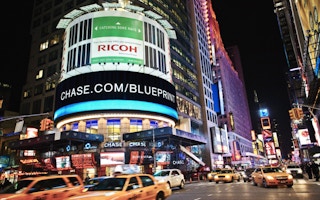The list of the most sustainable companies around the globe was announced on Wednesday at the sidelines of the World Economic Forum in Davos, Switzerland, where world leaders continue to congregate and discuss the most pressing affairs in business, politics and society.
To continue reading, subscribe to Eco‑Business.
There's something for everyone. We offer a range of subscription plans.
- Access our stories and receive our Insights Weekly newsletter with the free EB Member plan.
- Unlock unlimited access to our content and archive with EB Circle.
- Publish your content with EB Premium.
WestPac Banking Corporation emerged the leader in corporate sustainability worldwide, ranking first in the Global 100 Index. The Sydney-headquartered firm is one of the biggest financial service providers in Australasia, noted Corporate Knights, the magazine that has been ranking the sustainability performance of companies for ten years.
Along with WestPac, several other firms from the Asia Pacific region figured in the index, such as Singaporean companies City Developments Limited (listed at 39) and StarHub (29), and Japanese tech group Ricoh (77). A total of 18 companies from Asia Pacific were included in the listing, which is the same number of firms coming from the United States – the country with the strongest performance, said Corporate Knights.
Four other firms, in addition to WestPac, are headquartered in Australia: Australia and New Zealand Banking Group Limited (19), Commonwealth Bank of Australia (25), real estate firm Stockland (32), and food retailing business Wesfarmers (92).
Strong performance from a small nation
Among the Singapore representatives, which totalled four, Keppel Land Limited was the highest placed at the 17th spot, followed by StarHub, CDL, and CapitaLand Limited (56). All three latter companies have previously been included in the last edition of the Global 100 Index.
“
There is a heightened awareness with regards to sustainability issues among Asian countries today
Doug Morrow, Corporate Knights managing director
Doug Morrow, managing director of the clean capitalism magazine, commended Keppel Land for its strong performance. The company’s 2012 sustainability report, “Shaping the Future”, covered six categories, including environmental, human rights and product responsibility, as well as performance indicators from the Global Reporting Initiative (GRI) Construction and Real East Sector Supplement from the GRI Sustainability Framework.
He said: “This is the first time a Singapore company has done so well since the launch of the Global 100 in 2005. It goes to show that there is a heightened awareness with regards to sustainability issues among Asian countries today.”
“Similarly, in the real estate sector, with growing concerns on building green developments, it has further encouraged developers to implement sustainability initiatives in their business models,” he added.
Like Keppel Land, CDL and CapitaLand are property development firms in Singapore. StarHub is the only information and communications technology (ICT) firm among these four sustainable companies from the city-state.
CDL, which was the first firm in Singapore to be listed on the Corporate Knights ranking, is fully committed to aligning its business operations to environmental practices, as it continues to be on the index for five years straight.
“Since mid-1990s, CDL has committed to the vision of conserving as we construct. We are glad that our sustained efforts puts us amongst the best-in-class corporations worldwide,” said Esther An, City Developments Limited general manager for corporate affairs and head of corporate social responsibility.
Japan: proven performer in sustainability
Japan is another country in the region with a good representation of companies. Same with Australia, five Japanese firms made the list, led by real estate business Daiwa House Industry at the 65th spot.
Mitsubishi Heavy Industries, a multinational company into engineering and equipment yet classified as capital goods by Corporate Knights, came next at number 66. This was followed by pharmaceuticals and biotechnology firm Eisai (69) and Nissan Motor (74). Ricoh, which has been included in the index for ten years, rounded out the Japanese list for this year.
Kenichi Kanemaru, Ricoh corporate executive vice president, said: “At Ricoh, commitment to sustainability has been established over many decades. Alongside our expertise in office imaging equipment, production print solutions, document management systems and IT services, our commitment to sustainable business is a core part of who we are.”
According to the firm, they have long-term targets to reduce impact by 87.5 per cent by 2050, compared to 2000 levels. They are also dedicated to life cycle management in all aspects of their operations, in order to minimise resource use and implement the 3Rs or reuse, reduce and recycle.
Together with the companies from Australia, Singapore and Japan, there were also three from South Korea and one from Hong Kong.
Corporate Knights explained that all the companies listed have a market capitalization exceeding US$ 2 billion, which resulted into 3,641 companies considered for the 2014 Global 100 Index. However, after assessment using 12 key performance indicators, this was then narrowed to the final 100 sustainable firms.
Tan Tong Hai, StarHub chief executive officer, noted that it is no longer enough to have huge profits.
Investors are “also interested in how companies integrate people and planet into their triple bottom line,” he added.










